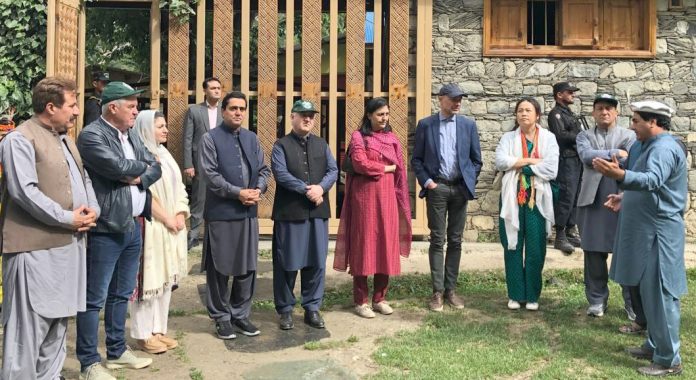DNA
ISLAMABAD – The Ambassador of Portugal to Pakistan, Frederico Silva, and the Ambassador of Denmark to Pakistan Ambassador Jakob Linulf recently visited various programmes of the Aga Khan Development Network in Chitral, Khyber Pakhtunkhwa.
The Ambassadors, who were accompanied by Mr Akhtar Iqbal, CEO of the Aga Khan Foundation, Pakistan, Ms Nusrat Nasab, CEO of Aga Khan Agency for Habitat (AKAH), Pakistan and Ms Laila Naz Taj, Director AKDN Pakistan Communications saw programmes in Garam Chashma, Chitral town and Kalash Valley including projects related to disaster preparedness and mitigations, climate change action, education, women entrepreneurship, infrastructure development, youth employability and renewable energy projects.
His Excellency Frederico Silva and His Excellency Ambassador Jakob Linulf expressed their deep admiration for the comprehensive approach of AKDN towards protecting the environment and mitigating climate change. His Excellency Frederico Silva, the Portuguese Ambassador to Pakistan shared that, “It was greatly rewarding to appreciate the integrated development of AKDN in the Chitral region.
The multipronged approach has produced a visible impact on the grassroot communities, elevating its empowerment and local capabilities. I was very happy to visit the AKRSP established Mogh Microhydel that is now very well managed by the Valley community itself. The Mogh Micro hydel provides electricity to 8000 people, 14 schools, a hospital and 165 enterprises.
Among many other positive developments, it significantly reduced the workload of the women as well as the environmental degradation. The Aga Khan Higher Secondary School in Chitral city was also a highlight of my visit, showcasing the highly enabling environment it provides for great minds to flourish and achieve excellence. Students from this school regularly reach very renowned universities in Pakistan and abroad. From natural resource management, education, IT employment and training platforms to climate change resilience, AKDN has been able to bring true community ownership to the far-flung valleys of Chitral.”
Ambassador Jakob Linulf added that AKDN’s multi-input area development has significantly improved the quality of life of the local people. Communities have been able to adapt to the changing climate and ensure sustainable livelihoods. While speaking about the programme funded by the Embassy of Denmark, ‘Increasing Community Resilience to Climate Change (ICRCC)’ which is being implemented by the Aga Khan Foundation through the Aga Khan Rural Support Programme and the Aga Khan Agency for Habitat, he noted, “These areas are prone to natural disasters and efforts are needed to escape the worse impacts of the climate change.
The focus of the programme on generating clean energy, nature-based solutions, installation of irrigation infrastructure, harnessing solar power for lift irrigation, empowering communities to establish passive solar greenhouses and training farmers on climate smart agricultural practices can promote environmentally conscious solutions that can reduce the impact of climate-induced disasters.” During the last two years, four microhydels have been rehabilitated, six passive solar green houses have been built, five irrigation channels have been rehabilitated through the programme.
Comprehensive habitat plans for 10 villages have been developed; WASH facilities have been improved in ten schools along with the provision of emergency response materials in 15 schools. The programme has established community-based disaster risk response teams, ensuring local communities are equipped with the necessary tools and knowledge to effectively respond to emergencies.

















